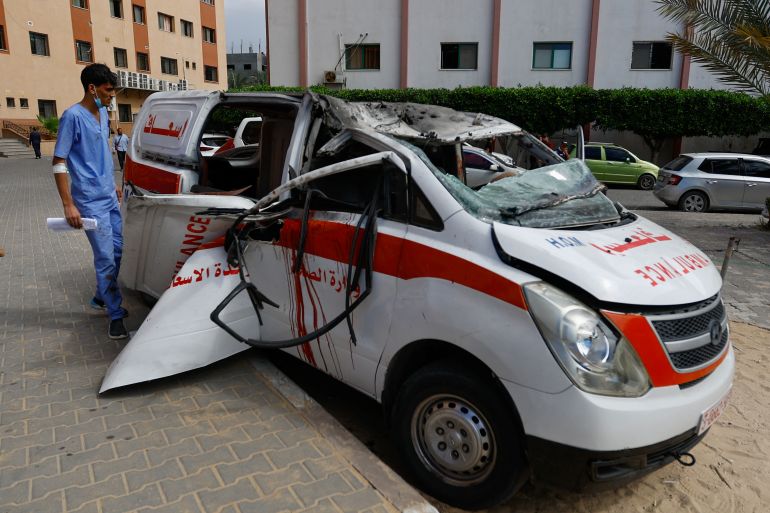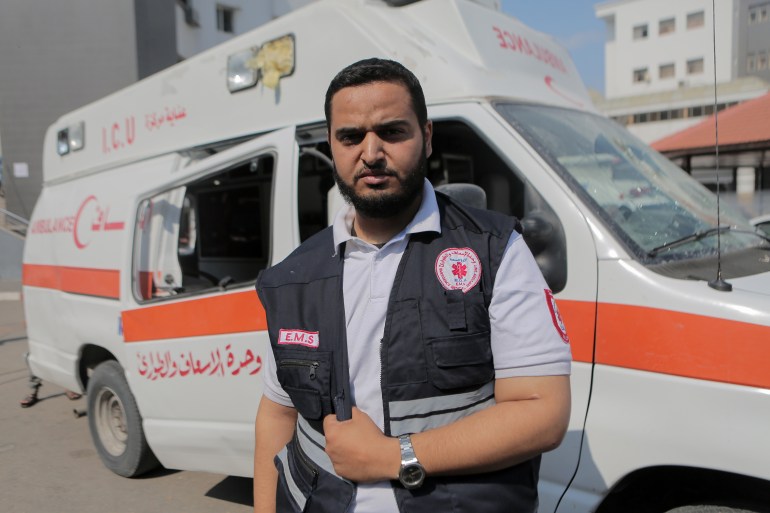Gaza medics say Israel targeting ambulances, health facilities
Medical organisations say Israeli air attacks have hit health services in what could constitute a war crime.

Talal Taha and his team at the al-Shifa Hospital, Gaza City’s largest, received an emergency call on Saturday evening and leaped into action. Earlier that day, Israel had begun pummelling the sealed-off Gaza Strip following a stunning attack by armed Palestinian group Hamas on Israeli territory.
Three vehicles headed to a location in the vicinity of the city’s eastern cemetery. The team followed the sound of cries for help as the city was enveloped in darkness.
Keep reading
list of 3 itemsCollective punishment of millions in Gaza not justified: Scotland leader
What is Gaza Strip, the besieged Palestinian enclave under Israeli assault?
“All of a sudden we were targeted [by an air attack] and we ran for safety,” Taha, a paramedic, told Al Jazeera. The emergency team jumped into their cars on Salah al-Din Road and the vehicles proceeded a few metres before another air strike hit.
Three of his colleagues were killed and Taha was lightly injured. “Our mission is humanitarian, we provide humanitarian service only, and we were targeted without any reason, without any excuse,” he said.
It was no one-off incident. Health authorities and medical organisations in the Gaza Strip have accused Israel of deliberately bombing ambulances and health facilities in the besieged enclave, in breach of international rules that catalogue such attacks as war crimes.
The Palestine Red Crescent Society (PRCS) on Wednesday condemned “the intentional targeting of medical teams”, which killed “four paramedics in less than half an hour today, despite prior coordination”.
“Targeting medical personnel is a grave breach to international humanitarian law and to humanity,” the organisation said in a statement on Wednesday. “PRCS demands accountability for this war crime, urging immediate investigation and justice for the victims.”
The health ministry in Gaza also denounced what it called “direct and systematic attacks on ambulances”.
“Targeting ambulances blatantly contradicts international laws and treaties that protect health facilities and services in places affected by armed conflicts,” it said on Tuesday.

At least 1,200 people have been killed in Gaza since the beginning of hostilities on Saturday, including hundreds of children and women, and more than 5,600 citizens have been wounded, the health ministry said.
Fifteen ambulances and nine health institutions have been hit, including the Ministry of Health building, the Rimal Clinic and the International Eye Center, it said.
Doctors Without Borders, (Medecins sans Frontieres, also known by its acronym MSF), said it had counted 16 medical personnel killed since Saturday, 18 ambulances destroyed and eight medical facilities damaged either totally or partially.
Sohaib Safi, medical coordinator for MSF in Gaza, said the scale of the damage was “very clear evidence” that medical aid in the enclave was being intentionally attacked by Israeli forces.
“When ambulances are trying to reach areas under fire, they are targeted as a message that no one should get inside to evacuate injured or stuck people,” Safi told Al Jazeera. As a result, taxis and private cars had increasingly been taking up the task of transferring the wounded to hospitals to avoid attracting attention.
Israel has been insisting that it warns civilians to evacuate buildings before striking them, through on the ground, many Palestinians have been hit without any warning. And Israel has made clear that it laying the stage for a ground invasion.
Israeli army spokesperson Jonathan Conricus on Wednesday said the Israeli military’s mission was “to make sure that Hamas, at the end of this war, won’t have any military capabilities by which they can threaten or kill Israeli civilians”.
Dwindling resources
At al-Shifa Hospital, it is not just patients and their families seeking help. Frightened Gaza City residents, too, have found shelter at the hospital, in the hope that it will not be attacked.
But already, the neonatal unit has been partly damaged due to bombardments around the facility, according to medical personnel.
Ghassan Abu-Sittah, a surgeon at al-Shifa Hospital, said the situation on Wednesday continued to deteriorate. “A number of patients, especially kids, are coming in with horrendous injuries,” he said.
“This morning we had a beautiful young girl with really indescribable facial injuries, whose mother is a doctor at al-Shifa and was killed when their home was targeted.”
Abu-Sittah added that the hospitals were full and were starting to run low on supplies.
“It’s all about a collapsing health system — the fact that there are 5,000 wounded in a health system with 2,500 bed-capacity,” he said. “It’s about patients not being able to get to the operating room space before there are no more operating rooms available.”
MSF’s Safi said the organisation had already used half of its emergency provisions, which it schedules to last two months in times of crisis.
Israeli Defence Minister Yoav Gallant on Monday announced a full blockade of Gaza, including a ban on the admission of food, electricity and fuel into the territory.
Hospitals have had no access to the electrical grid and depend on fuel to power their generators. At al-Shifa Hospital, medical personnel estimated fuel supplies could last three to four days at most.
The acute shortage of medicines to cater to an ever-growing number of patients is already having severe repercussions on some of the most vulnerable patients. The Ministry of Health estimated that 9,000 patients in Gaza suffer from cancer and are in need of treatment.
Blood for transfusions, essential medicines, medical equipment and desalinated water are also needed across the Gaza Strip, medics said.
Mahmoud Shalabi, senior programme manager for the United Kingdom-based organisation Medical Aid for Palestinians (MAP) in Gaza, expressed concern for the prospect of a tightening blockade and a potential ground invasion.
“I hope not,” he told Al Jazeera. “Because [if so], this is going to be the worst humanitarian catastrophe that Palestinians have seen since 1948.”